Powerball winner who won $70 million jackpot fights to help other lottery winners keep their names private after she fell victim to identity theft
What was meant to be a joyful time for a Michigan Powerball winner turned into a serious case of identity theft, social media scams and stolen money.
Cristy Davis, who won $70 million in 2020, is fighting to keep the identities of lottery winners secret after hers was stolen and used to scam multiple social media users.
Michigan law says lottery winners who take home more than $10,000 in local games can claim their prizes secretly, but winners of multi-state games like Powerball cannot remain anonymous.
Davis’ win was highly publicized, which she said led to numerous scammers using her identity to rob people.
Davis told it Lottery Post that her lawyer tried to hide her identity and claim the money anonymously, but this was not allowed.
Cristy Davis, who won $70 million in 2020, is fighting to have the identities of lottery winners kept secret after hers was stolen and used to scam multiple social media users
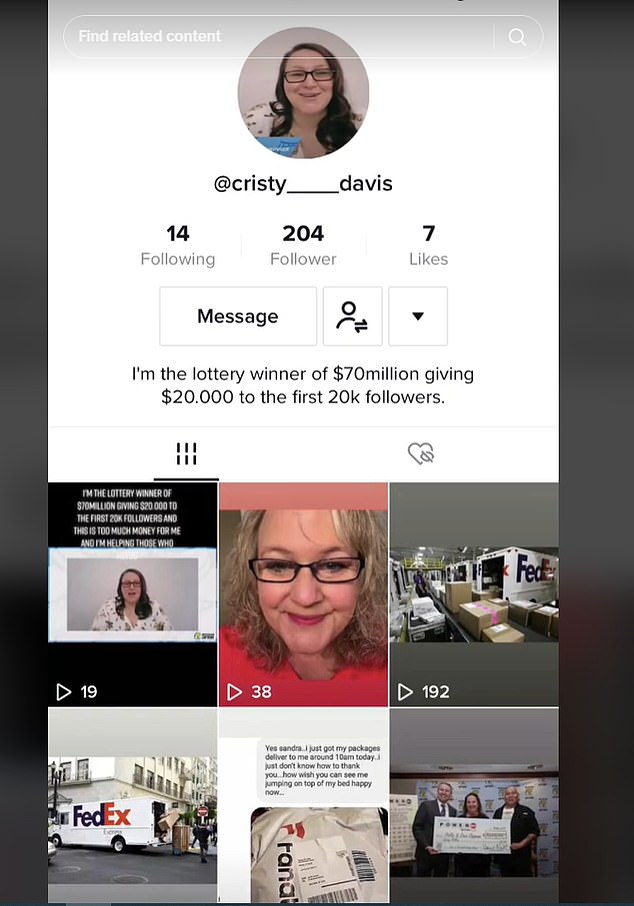
Davis’ win was highly publicized, which she said led to numerous scammers using her identity to rob people
“We tried to get a lawyer to see if I can (claim) anonymously, and they said no. That was my biggest thing: I didn’t want to be on TV. I know so many who have been through so much in life, and it was that or no money,” Davis said.
Scammers have created multiple fake social media accounts claiming to be Davis and asking people for their banking information in order to send them some of her winnings as a donation.
Once they receive the bank details, the scammers destroy entire savings accounts in one go.
She further told Lottery Post: ‘I saw a message in (the) Waterford Matters Facebook group: ‘This is Cristy Davis, and I give blah blah blah blah… Send me this information to this phone number.’ Comments on (the post) are like, “They cleaned out my bank account.” Why would you give anyone your bank account information?’
“And then I have friends there (who reply), ‘That’s not really her,’ they say I’m not on social media, and I changed my name.
“The lottery people need to know when they announce your name, this is what happens. The Lottery even sent me an email saying, “Oh, we heard you’re scamming people here.” I said, ‘You know, that’s what happens when you make people’s names public.’
‘I’m not cheating anyone, I have money. Why would I want to hack into someone’s bank account and take their money when there’s probably $200 in their bank account? Just leave me alone.”
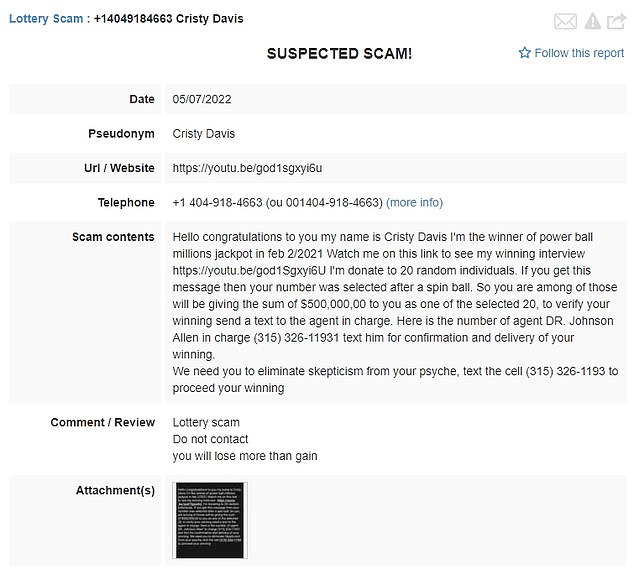
Messages involving varying amounts of money are being sent to various Instagram users and local Facebook groups, who have started sharing screenshots of their conversations on TikTok
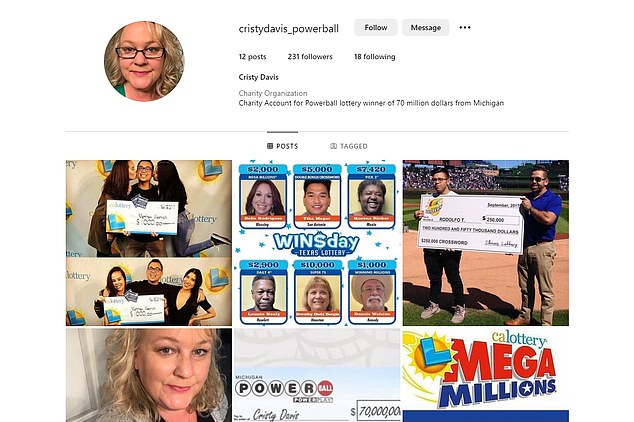
Scammers have created multiple fake social media accounts claiming to be Davis and asking people for their banking information in order to send them some of her winnings as a donation
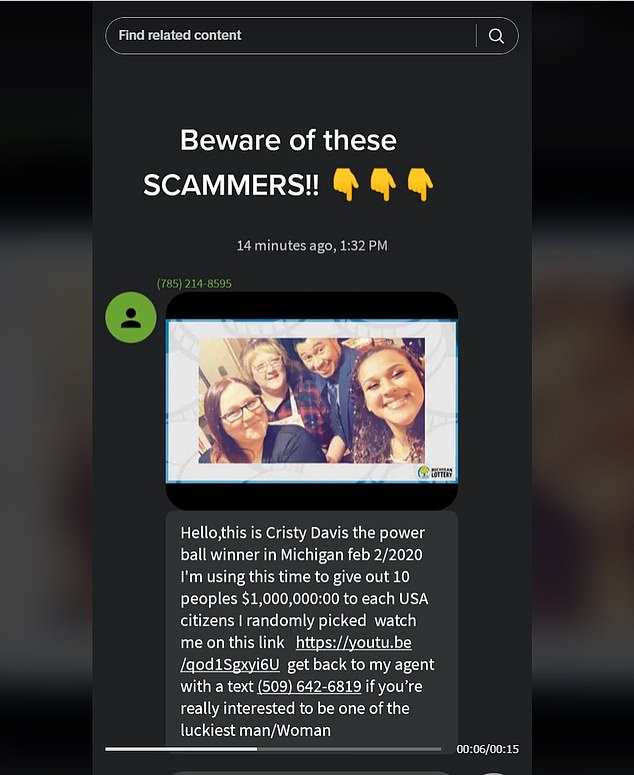
Once they receive the bank details, the scammers destroy entire savings accounts in one go
One of the spam messages read: ‘Hello congratulations, my name is Cristy Davis. I am the winner of the Power Ball Millions jackpot on February 2, 2021. Check me out at this link to see my winning interview https://youtu.be/god1Sgxyi6U I am donating to 20 random individuals.
‘If you receive this message, your number has been chosen after a spin. So you are among those who, as one of the 20 selected, will give you an amount of $500,000.00. To verify your winnings, send an SMS to the responsible agent.
“Here’s Officer DR’s number. Johnson Allen, responsible for (315) 326-11931, text him for confirmation and delivery of your winnings. We need you to eliminate the skepticism from your psyche, text cell (315) 326-1193 to continue winning.”
Similar messages with varying amounts of money are being sent to various Instagram users and local Facebook groups, who have started sharing screenshots of their conversations on TikTok.
With the exception of Delaware, Kansas, Maryland, North Dakota, Ohio and South Carolina, all other states do not allow people to take home their victory anonymously.
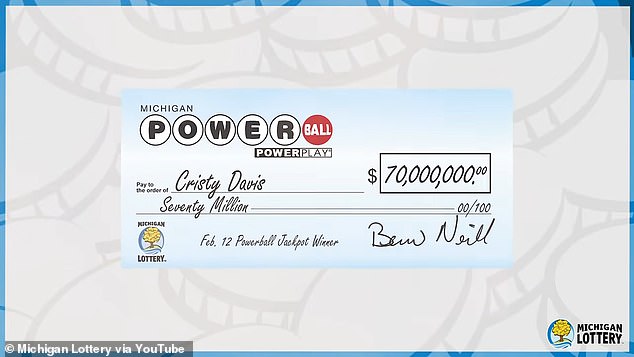
With the exception of Delaware, Kansas, Maryland, North Dakota, Ohio and South Carolina, all other states do not allow people to take home their winnings anonymously
In 2020, Davis went from living paycheck to paycheck to matching all five numbers plus the Powerball. Instead of receiving the money in installments, she took home the full amount of approximately $36 million after taxes.
“I was just living check to check, staying with my grandma, saving my money, just working at a dealership, driving parts to different dealerships and to car shops,” she said in an interview with The Detroit News.
Davis was out with her boyfriend, who was already buying tickets for his aunt and uncle. She also ended up withdrawing $20 from the ATM to use for her own Mega Millions and Powerball tickets.
The morning after she bought her tickets, a friend alerted her via FaceTime that the winning Powerball ticket had been purchased at the same place she bought hers.
“My friend Erica is sitting next to me and she says, ‘No.’ I shouted throughout the store and everyone came running. It was literally a three second thrill, and then it was like this was too good to be true. It still hasn’t dawned on me that it’s real.’
Davis did not say whether she has taken action to protect the identities of future winners.
